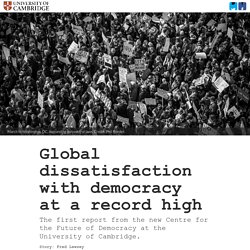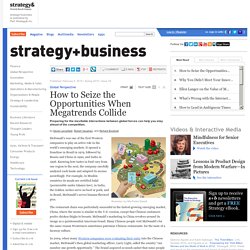

Global dissatisfaction with democracy at a record high. Dissatisfaction with democratic politics among citizens of developed* countries has increased from a third to half of all individuals over the last quarter of a century, according to the largest dataset ever created on global attitudes to democracy.

In fact, researchers found that across the planet – from Europe to Africa, as well as Asia, Australasia, both Americas and the Middle East – the share of individuals who say they are “dissatisfied” with democracy has jumped significantly since the mid-1990s: from 47.9% to 57.5%. The research team, from the University of Cambridge’s new Centre for the Future of Democracy, say that the year 2019 “represents the highest level of democratic discontent on record”. Detailed stocktaking of global political sentiment began in 1995. The report used a unique dataset of more than 4 million people.
The report, along with the new Centre, which will be based at the Bennett Institute for Public Policy, is launched at Clare College in Cambridge this evening. Neoliberalism must be pronounced dead and buried. Where next? What kind of economic system is most conducive to human wellbeing?

That question has come to define the current era, because, after 40 years of neoliberalism in the United States and other advanced economies, we know what doesn’t work. The neoliberal experiment – lower taxes on the rich, deregulation of labour and product markets, financialisation, and globalisation – has been a spectacular failure. Growth is lower than it was in the quarter-century after the second world war, and most of it has accrued to the very top of the income scale. After decades of stagnant or even falling incomes for those below them, neoliberalism must be pronounced dead and buried. Vying to succeed it are at least three major political alternatives: far-right nationalism, centre-left reformism and the progressive left (with the centre-right representing the neoliberal failure). The centre-left, for example, represents neoliberalism with a human face. Progressive capitalism is not an oxymoron.
Future of Business and Work. Reinsurance trends. Sustainability. How to Seize the Opportunities When Megatrends Collide. McDonald’s was one of the first Western companies to play an active role in the world’s emerging markets.

It opened a franchise in Brazil in 1979, followed by Russia and China in 1990, and India in 1996. Knowing how tastes in food vary from one region to the next, the company carefully analyzed each locale and adapted its menus accordingly. For example, in Muslim countries its meals are certified halal (permissible under Islamic law); in India, the Golden Arches serve no beef or pork; and in Brazil, McDonald’s serves banana-flavored pies. The restaurant chain was particularly successful in the fastest-growing emerging market, China, where the menu is similar to the U.S. version, except that Chinese customers prefer chicken thighs to breasts. McDonald’s marketing in China revolves around its image as a quintessential American brand.
What made McDonald’s persevere in China, and why did its U.S. The second megatrend involved cultural transformation stemming from demographic change.
New Economic system/trends and new paradigms. High tech. Health and science. General trends lists. Innovation. Shortage of Rare Earth Elements. Synthetic Biology and metabolic engineering.
Big Data and data mining. Publishing. Frequency of Natural Disasters/Climate Change. Shift from West to East. Energy and Electricity supply.
3D Printing.